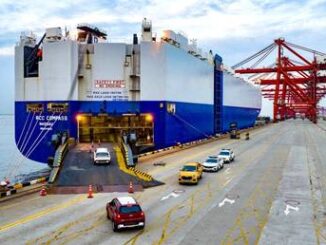
In a significant move to curb Iran’s illicit oil revenues, the U.S. Treasury Department has imposed sanctions on a shipping network accused of smuggling Iranian crude oil by disguising it as Iraqi crude. The network, led by Iraqi-Kittitian businessman Waleed Khaled Hameed al-Samarra’i based in the United Arab Emirates, is said to have facilitated the transport of approximately $300 million worth of Iranian oil.
This operation involved blending Iranian barrels with Iraqi oil and marketing the mixture as purely Iraqi-origin crude to evade international sanctions. The sanctioned entities include Babylon Navigation DMCC, along with several vessels and companies used to obscure the network’s activities. Key ships targeted are the Liberia-flagged tankers Adena, Liliana, and Camilla, which conducted ship-to-ship transfers in the Arabian Gulf and loaded cargo in Iraqi ports.
Are you Paying High Taxes in New Jersey, New York, or California?
Additional Marshall Islands-registered firms such as Tryfo Navigation, Keely Shiptrade Limited, Odiar Management, Panarea Marine, and Topsail Shipholding were also hit with sanctions. Treasury Secretary Scott Bessent emphasized that these measures aim to degrade Iran’s ability to fund attacks against the U.S. and its allies by targeting its oil revenue streams.
This latest action comes amid ongoing U.S. efforts to disrupt Iran’s “dark fleet”—a shadowy network of aging tankers that operate outside standard maritime regulations to transport sanctioned oil. As of 2025, estimates suggest Iran’s dark fleet comprises over 400 vessels, many of which are blacklisted and rely on deceptive practices like disabling AIS transponders, flag-hopping, and ship-to-ship transfers to avoid detection.
The fleet has grown in response to tightened sanctions, with some reports indicating a total shadow fleet (including Russian and Venezuelan vessels) exceeding 500-1,000 ships globally.
Recent U.S. sanctions have targeted dozens more entities in 2025 alone, including 13 vessels in February, highlighting the fleet’s persistent expansion despite enforcement.
The blending of Iranian oil into Iraqi exports raises concerns for major importers of Iraqi crude, who may unknowingly receive sanctioned volumes. In 2023, California— a key U.S. refining hub—sourced 21.7% of its foreign crude oil imports from Iraq, amounting to roughly 69.7 million barrels out of a total foreign intake of 321 million barrels.
This made Iraq California’s top foreign supplier that year, ahead of Saudi Arabia (15.7%) and Brazil (15.1%). California’s total crude receipts in 2023 were 529 million barrels, with foreign sources accounting for 60.7%.
For 2024, foreign imports rose slightly to 324 million barrels (63.5% of total), though country-specific breakdowns are not yet fully available.
These figures underscore California’s heavy reliance on Middle Eastern oil, potentially exposing the state to risks from disguised Iranian supplies. Globally, Iraq’s crude oil exports remain robust, totaling around 1.23 billion barrels in 2024 at an average of 3.31 million barrels per day (bpd).
Asia dominates as the primary market, receiving about 70% of Iraqi exports, valued at over $71 billion in 2024.
The top importers in 2024 were:China: 1.19 million bpd (33% of Iraq’s exports)
India: 979,000 bpd (27%)
South Korea: 338,000 bpd (9%)
United Arab Emirates: 287,000 bpd
United States: 242,000 bpd (7%)
These sanctions highlight the challenges in policing global oil flows, especially as Iran continues to export around 1.5-2 million bpd despite restrictions, often via its dark fleet. For energy markets, the move could tighten scrutiny on Iraqi shipments, potentially affecting prices and supply chains for importers like California. As nuclear talks with Iran remain stalled, expect further U.S. actions to pressure Tehran’s oil lifeline.
And for the United States, this brings up a huge national security issue. Why is California buying 65 to 70% of its oil from places that have been sanctioned, or are publicly calling for the death of America? And having Iranian or Iraqi ships in our ports is not a big deal, or is it? We have tracked through open sources in the dark fleet other wild imports for California, like Rusian
Avoid Paying Taxes in 2025
Crude Oil, LNG, Jet Fuel price quote
ENB Top News
ENB
Energy Dashboard
ENB Podcast
ENB Substack






